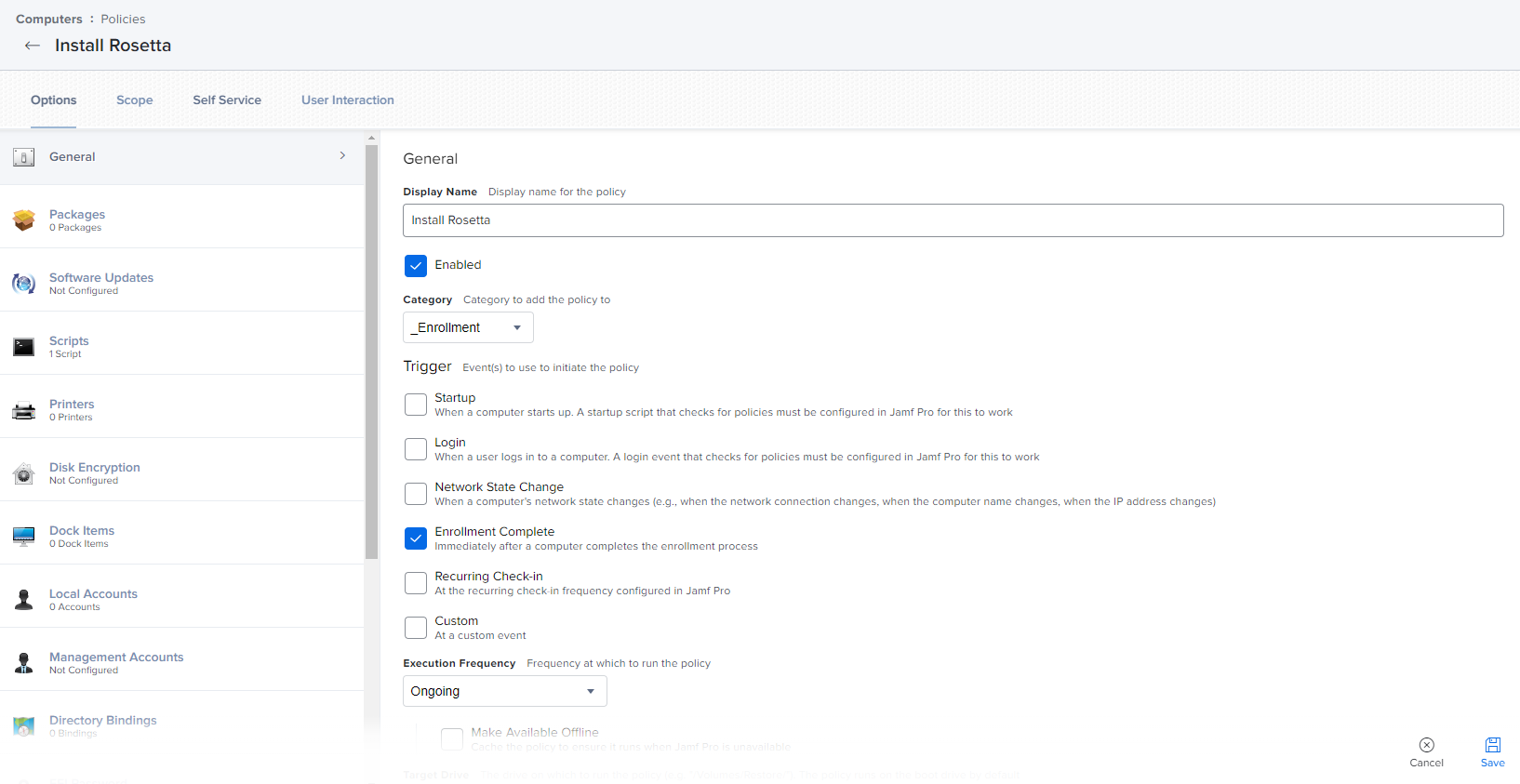Deploying Rosetta to M1 Devices with Smart Computer Groups
Rosetta and Smart Computer GroupsPermalink
Not all apps are universal and at the time of this post, Jamf has not released patch management for Intel and Apple Silicon based devices separately. In this environment, a majority of our devices are Intel based. If a universal package is not available, we default to using the Intel version of the package we’re trying to deploy or update. Because of this, we install Rosetta depending on whether if the computer is Apple Silicon based or not through Smart Computer Groups.
What is it?Permalink
In a nutshell, Rosetta 2 allows Intel applications to run on Apple Silicon based devices.
Source: What Is Rosetta 2 on Mac?
1. Creating the Smart Computer GroupPermalink
- Navigate to Computers > Smart Group Groups > New
- Display Name: Apple Silicon
- For Criteria, when you go to Add, you may have to press
Show Advanced Criteria. There will be one forApple Silicon. - Set the operator to
isand the value toYes
2. Creating the ScriptPermalink
#!/bin/bash
# Installs Rosetta as needed on Apple Silicon Macs.
exitcode=0
# Determine OS version
# Save current IFS state
OLDIFS=$IFS
IFS='.' read osvers_major osvers_minor osvers_dot_version <<< "$(/usr/bin/sw_vers -productVersion)"
# restore IFS to previous state
IFS=$OLDIFS
# Check to see if the Mac is reporting itself as running macOS 11
if [[ ${osvers_major} -ge 11 ]]; then
# Check to see if the Mac needs Rosetta installed by testing the processor
processor=$(/usr/sbin/sysctl -n machdep.cpu.brand_string | grep -o "Intel")
if [[ -n "$processor" ]]; then
echo "$processor processor installed. No need to install Rosetta."
else
# Check for Rosetta "oahd" process. If not found,
# perform a non-interactive install of Rosetta.
if /usr/bin/pgrep oahd >/dev/null 2>&1; then
echo "Rosetta is already installed and running. Nothing to do."
else
/usr/sbin/softwareupdate --install-rosetta --agree-to-license
if [[ $? -eq 0 ]]; then
echo "Rosetta has been successfully installed."
else
echo "Rosetta installation failed!"
exitcode=1
fi
fi
fi
else
echo "Mac is running macOS $osvers_major.$osvers_minor.$osvers_dot_version."
echo "No need to install Rosetta on this version of macOS."
fi
exit $exitcode
3. Create the PolicyPermalink
- Make sure the Trigger is set to
Enrollment Completeand the Execution Frequency is set to Ongoing - Ensure the scope is set to the Smart Computer Group we just created
What about DEPNotify?Permalink
- Out of all my policies, this is the only one that that is triggered to install during enrollment.
- Through my own testing, it’s important not to have more than two policies trigger to install during enrollment as that could cause the Jamf binary to fail during the enrollment process.
- If you’re curious about DEPNotify, please refer to this article:
. Below is a screenshot of the policies being installed in my depNotify.sh:
#########################################################################################
# Policy Variable to Modify
#########################################################################################
# The policy array must be formatted "Progress Bar text,customTrigger". These will be
# run in order as they appear below.
POLICY_ARRAY=(
"Installing Adobe Creative Cloud,install-creativecloud"
"Installing Google Chrome,install-chrome"
"Installing Webex,install-webex"
"Installing Zoom,install-zoom"
"Installing Webex Drivers,install-webex-driver"
"Installing Zoom Drivers,install-zoom-driver"
"Installing Custom Dock,set-dock"
"Preparing for the next login,uninstall-depnotify-installers"
)



